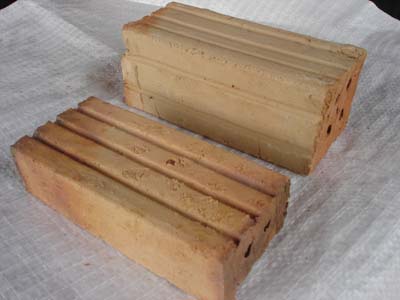
For years, I’ve ruled out building with brick because of the large amount of energy consumed in the manufacturing process, and the associated environmental toll. Like concrete and other high embodied energy materials, high-fired brick is generally not considered a sustainable building option (excluding recycled brick, of course). Although high-fired brick is extremely durable, there are more sustainable choices.
Low-fired brick is one interesting option. It is the building system of choice for millions (possibly billions) in certain regions of the world, including tropical climates. This type of brick requires almost no maintenance, is fireproof and relatively inexpensive — about 1.5 to 2.5 cents each.
Low-fired brick is a very sustainable building material with low embodied energy. They are made with locally procured clay and fired with rice hulls, a by-product of growing rice. Brickyards are located near urban areas to minimize transport costs.
[Note to earthbag builders: Low-fired brick is great for interior walls. That’s why I’m publishing this information here on our earthbag blog. This is how we built the bathroom walls in our earthbag roundhouse.]
You can read the entire article for free at Mother Earth News Blog.

Compressed earthen block might be yet another good alternative, especially in the U.S. where hydraulic machines are in use in many parts of the country to make them on site. In India, these are used for structures up to five stories tall, and they are similarly good at resisting weather.
Manual-powered tools such as the CINVA ram that has been around for thirty or more years are also used; this type of CEB press is produced in India today and is in widespread use in many parts of the third world.
Yes, this is another great possibility. Here’s a short video on CEBs on my YouTube channel.
http://www.youtube.com/user/naturalhouses#p/u/0/N_1FgpRoXyU